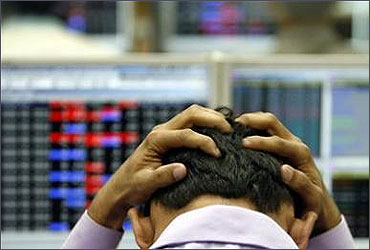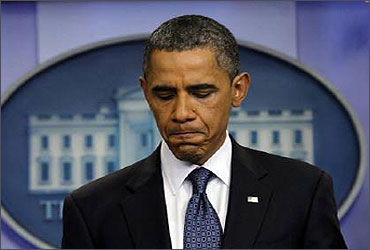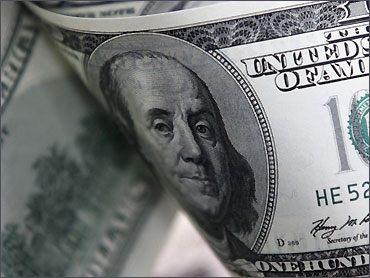
As I write this, the share BSE Sensex, the premier stock market index in the country has fallen by 600 odd points or around 3.58 per cent, since opening on Friday.
Since its close on Monday (August 1), the Sensex has fallen more than 1,000 points or around 6.4 per cent.
So what is pulling the Sensex down? On Thursday (August 4), the Dow Jones Industrial Average, the premier stock market index in the United States fell by around 4.3 per cent or 500 odd points.
As a reaction to that the Indian markets have slumped on Friday. So 'when America sneezes, the whole world including India catches cold'.
Click on NEXT for more...

Hence, the question is why is America sneezing?
On August 2, 2011, the United States (US) passed a law which allowed it to increase the debt level of the government by $2.4trillion from the current level of $14.3trillion.
This was only one day ahead of the deadline of August 3, 2011.
By getting so close to the deadline, the US government had almost run out of money and would have defaulted on the payments it was supposed to make, if the debt ceiling wasn't raised.
Click on NEXT for more...

Why is the US government running out of money?
This is primarily because its expenses are more than its revenues. For the year 2011, the US government is expected to spend $3.82 trillion whereas it has revenues only to the effect of $2.17trillion.
This difference of $1.65 trillion is referred to as fiscal deficit. So it has to borrow in order to meet the difference.
But the trouble was it had borrowed all it could and almost reached the allowed level of $14.3 trillion.
If this ceiling hadn't been raised the US government would have been defaulting on payments of things like salaries to its employees, pension to retirees, and payments it had to make to private companies.
It would also mean a default on the payment of interest on financial securities issued by the US government to finance its fiscal deficit.
Click on NEXT for more...

So isn't it a good thing that the debt ceiling was raised?
The answer is both yes and no. Of course, by raising the debt ceiling the US can continue to borrow and hence not default on the various payments it was supposed to make.
But the bigger question is how will the government finance its whopping fiscal deficit of $1.65 trillion?
In the normal course of things, the government could have borrowed from its own citizens and financed the fiscal deficit.
But the trouble is the American citizens are as or even more broke than its government. So the only option is to borrow dollars from outsiders.
Click on NEXT for more...

Who can America borrow from?
Countries around the world sell stuff to Americans. They earn dollars in the process.They also buy stuff from America and pay in dollars.
The difference between the money earned by selling stuff to America and the money paid while buying stuff from America comes to around $500 billion.
And this is referred to as the foreign exchange reserves that countries around the world have.
This money can be used by governments around the world to buy financial securities issued by the US government to finance its fiscal deficit.
Even if all the money is used to finance the American fiscal deficit it still leaves a gap of around $1.15 trillion ($1.65 trillion - $500billion). Where is this money going to come from?
Click on NEXT for more...

So what is the way out?
Given this, the only way out for the US government is to print the money, beyond what it can raise by selling financial securities.
Now printing dollars in order to finance expenditure doesn't always get the markets excited. This is primarily because it lowers the value of the dollars that are already there in the market.
Also, with the amount of debt crossing $14.3 trillion, the US government debt to GDP (Gross Domestic Product) ratio has now crossed 100 per cent, which is getting into really dangerous territory.
The total US debt as a percentage of GDP is around 300-400 per cent, depending on which estimate you take. And this has the stock market worried.
Click on NEXT for more...

But the stock market always knew this?
The fact of the matter is that the US debt to GDP ratio did not become so high overnight.
So why is the stock market reacting now? Well, the only answer for this is that markets do not always function correctly, but eventually they do catch up.
John Mauldin and Jonathan Tepper make this point in their new book Endgame - The End of the Debt Supercyle and How It Changes Everything.
"If you get to really high debt levels, you don't make it. The market gets eventually concerned," thjey wrote.
And so the US stock markets tanked on Thursday.
Click on NEXT for more...

But why is the Sensex falling?
Now the trouble is with America and the Americans, why is the stock market in India falling. International investors have a certain allocation across various markets.
And when they lose money in one market they try and recover it from another market.
So when the US markets fall, like they did yesterday, the international investors try and recover some of their money from the Indian market by selling stocks they hold here.
So for the first four days of August, the foreign institutional investors have already sold stocks worth Rs 1,239 crore (Rs 12.39 billion) in India.